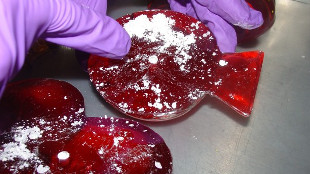 FLICKR, UKHOMEOFFICEA protein involved in HIV transcription enhances the rewarding effect of cocaine and causes mice to become even more hyperactive when they're on the drug, researchers report today (August 15) in Neuropsychopharmacology. The findings could help explain why people infected with HIV and who use drugs tend to suffer more neurological and cognitive decline than people who don't have the disease or don't abuse substances.
FLICKR, UKHOMEOFFICEA protein involved in HIV transcription enhances the rewarding effect of cocaine and causes mice to become even more hyperactive when they're on the drug, researchers report today (August 15) in Neuropsychopharmacology. The findings could help explain why people infected with HIV and who use drugs tend to suffer more neurological and cognitive decline than people who don't have the disease or don't abuse substances.
The link between HIV, drug abuse, and cognitive decline has “been observed epidemiologically for some time, but the mechanisms of how that interaction might occur have really been very elusive,” said Rosemarie Booze, a professor at the University of South Carolina, who was not part of the study. “I think this paper sheds important information in terms of identifying how those drugs and HIV might interact and affect brain function.”
The ways in which HIV itself might affect drug use have not been well understood, said Jay McLaughlin, an associate member at Torrey Pines Institute for Molecular Studies in Port Saint Lucie, Florida, and one of the study’s authors. Tat, a neurotoxic protein that facilitates the transcription of HIV genes in infected individuals, has been ...















